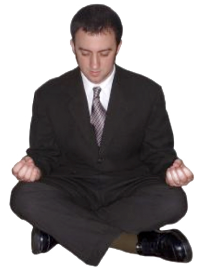Meditation keeps cropping up in the books I’m reading and the podcasts that fill the airwaves while I exercise. The advocates talk about the peacefulness, clarity, and energy-boost that they experience through regular practice. As I’m intrigued by their witness, I thought I’d see what the “experts” have to say about it.
For my first stop on this tour, I chose a book by Dr. Norman E Rosenthal, PhD, a clinical professor of psychiatry at Georgetown University and 30-year veteran of clinical practice. He has also conducted research in behalf of the National Institute of Mental Health for 20 years. So he can reasonably claim to offer expert commentary in Transcendence: Healing Through Transcendental Meditation.
 Dr. Rosenthal’s transcendental meditation (a.k.a. “TM”) is a specific form of meditative practice that makes use of individually-tailored mantras during two 20-minute sessions daily. A certified trainer provides instruction on the technique and works with each client to choose the right mantra and use it correctly. Follow-up sessions on consecutive days reinforce the training. (See www.tm.org.)
Dr. Rosenthal’s transcendental meditation (a.k.a. “TM”) is a specific form of meditative practice that makes use of individually-tailored mantras during two 20-minute sessions daily. A certified trainer provides instruction on the technique and works with each client to choose the right mantra and use it correctly. Follow-up sessions on consecutive days reinforce the training. (See www.tm.org.)
TM confers a state of calmness while helping organize the prefrontal cortex in a way that improves focus and decision making. It allows the practitioners to feel a connection to something beyond the self while setting aside consciousness of date, time, and place. In this state of transcendence, one experiences 4 gifts: (i) the gift of being (not doing), (ii) the gift of retreat from the cares and concerns of the world, (iii) the gift of stress-release (physically and/or psychologically), and (iv) the gift of insights.
These high-level benefits have been touted since I first learned about TM years ago. Yet they’ve never inspired me to get past the fidgetiness that I experience every time I try to sit still for a 20-minute session. So I read on to see what Dr. Rosenthal has witnessed through decades of clinical practice.
HEALING: TM has been shown to lower blood pressure, increase insulin sensitivity, and improve cardiac health. It calms the sympathetic nervous system, thereby lowering the stress response. Stress has a deleterious effect on the cardiovascular and immune systems. It also accelerates aging. (He notes that when it comes to cardiovascular disease, it may not be solely about what you eat; it’s also about what’s eating you!) Meditators have superior health profiles, though Dr. Rosenthal allows as how their lifestyles may be more health-promoting than non-mediators.
TRANSFORMATION: Anger and anxiety may serve us when directed toward specific circumstances of limited duration. They fail us when a chronic state of heightened arousal leads to stress-induced physical and psychological challenges, including depression. While cognitive therapy works to change surface behaviors relative to anger, anxiety, and depression, TM works toward a ground of being that is more peaceful. By calming the mind, it helps patients respond to stressors in a clear-headed way. They’re less prone to acting on impulse or being overcome by their emotions. It trains the mind to let disquieting thoughts pass, rather than ruminate on them endlessly. It also has a positive impact on personal organization, effectiveness, and quality of thinking.
HARMONY: TM helps thoughts become more orderly and priorities easier to perceive and pursue. Practitioners focus on what’s important or urgent, not the “noise” that clamors for their attention. The uncluttered mind also has the freedom to explore new directions, to innovate, and to see things with fresh eyes. Most long-time meditators are relaxed in body, alert in mind, and open in spirit. They feel a sense of harmony within their minds, between their minds and bodies, and between themselves and others. Prisons and schools have been transformed by meditation. When practiced consistently by a group of teens, they were shown to have less absenteeism, suspensions, and school violations.
Dr. Rosenthal stressed the importance of working with a certified trainer when adopting this practice. I found a local provider that supports the technique available through Maharishi Foundation USA, a federally recognized 501(c)(3) non-profit educational organization. The fees are not for the faint of heart (or budget), although they offer lower rates for students and financially challenged individuals.